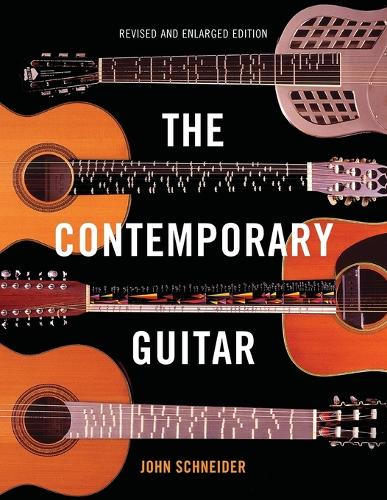
The Contemporary Guitar
(Paperback)
Publishing Details
The Contemporary Guitar
By (Author) John Schneider
Bloomsbury Publishing PLC
Rowman & Littlefield Publishers
20th August 2015
United States
Classifications
General
Non Fiction
Techniques of music / music tutorials / teaching of music
787.87193
Physical Properties
Paperback
360
Width 216mm, Height 278mm, Spine 22mm
1007g
Description
The Contemporary Guitar traces the extraordinary rise of the instrument in concert music over the past century. Though recognized worldwide as a popular music icon, the all-to-recent time when the guitar was looked down upon as a second-class citizen in the world of serious music is finally past, and it can now be found in the scores of the most important composers. The guitars rightful place in chamber music, orchestral music, or as a solo instrument is now without question, whether in the classic acoustic form or the more recent electric version. While the guitar has stood in the vanguard of musical experimentation, its many new techniques and notations remain a mystery for many composers and players. In The Contemporary Guitar, musician and scholar, John Schneider explains each class of technique and illustrates them with examples. Moreover, because the guitar is easily refretted, it has also become a leading instrument in the exploration of the relatively new musical language of microtonality. In this revised and enlarged edition from the original work of three decades ago, Schneider adds a broad-ranging, entirely new chapter on the instruments, notation and repertoire with insights into the interpretation of historical works through the application of accurate contemporary tunings and temperaments. The guitars unique timbreits tone coloris one of the most versatile among modern instruments, both acoustic and electric. Most players who intuitively explore the subtleties of tone color will find outlined in The Contemporary Guitar the specific principles of physics that determine these subtleties which, once mastered, permit guitarists to control more completely the expressive palette of their instrument. Designated the Rational Method of Tone Production by its author, Schneider defines in great detail the timbral characteristics of acoustic and electric instruments from theoretical, physical, and musical viewpoints. Players in search of new repertoire will find an historical survey of the literature, an exhaustive list of new music, and a multitude of techniques for bringing such music to life. The Contemporary Guitar provides audio examples online for those seeking to discover new sounds and includes the notation to perform them.
Reviews
The new edition of John Schneider's The Contemporary Guitarcelebrates the author's encyclopedic knowledge of the modern guitar landscape withan information-packedjourney through the farregions ofmusical creativityby leading composers and guitarists of the past fifty years. Using dozens of audio examples and hundreds of illustrations,The Contemporary Guitarexplores the physics of sound production and the developmentofa wild arrayof guitar designs, from the traditional through theradical.Schneider'sbrilliant bookismandatory reading for anyone who cares about the explosion of music and ideas that has characterized the guitar in our time. -- David Starobin, guitarist and Grammy-winning record producer
I wish that I were a poet so that I could in a few short words say eloquently all the good things there are to say about John Schneiders The Contemporary Guitar. This book is a marvel: encyclopedic in scope, inter-disciplinary in a way far too little of our standard literature is, and yet always enlivened by his passion for an immense subject he knows more about than any of the rest of us. I love opening the doors of this cathedral and wandering about in it! His lifetime labor of love (now in its most welcome second edition) has given us all a sanctuary of enlightenment and wisdom. -- Eliot Fisk, concert artist, professor of Guitar, New England Conservatory, Boston; and Universitt Mozarteum, Salzburg
Author Bio
John Schneider is the Grammy-winning guitarist, composer, author, and broadcaster whose weekly television and radio programs have brought the guitar into millions of homes. He holds a doctorate in music and physics from the University College Cardiff (Wales) and music degrees from the University of California and the Royal College of Music in London. He is president emeritus of the Guitar Foundation of America and has published dozens of articles on contemporary guitar music.
